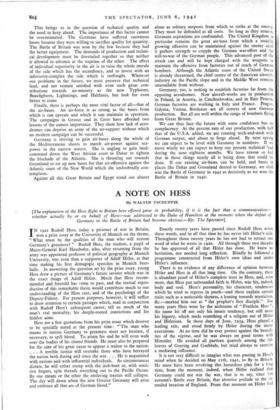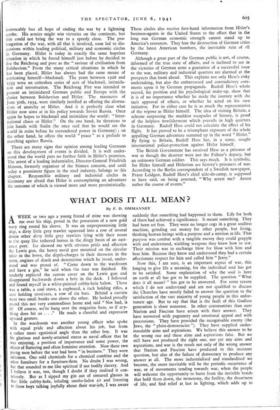A NOTE ON HESS
By WALTER TSCHUPPIK
[The explanation of the Hess flight to Britain here offered gains in probability, if it is the fact that a communication— whether actually by or on behalf of Hess—was addressed to the Duke of Hamilton at the moment when the defeat of Germany in the Battle of Britain had become obvious.—ED. The Spectator] IN 1921 Rudolf Hess, today a prisoner of war in Britain, won a prize essay at the University of Munich on the theme, " What must be the qualities of the man who will restore Germany's greatness? " Rudolf Hess, the student, a pupil of Major-General Karl Haushofer, who, after returning from the army was appointed professor of political geography at Munich University, was even than a supporter of Adolf Hitler, at that time making his first demagogic speeches in Munich beer- halls. In answering the question set by the prize essay, young Hess drew a picture of Germany's future saviour which was in the exact image of Adolf Hitler. Much that Hess recom- mended and foretold has come to pass, and the textual repro- duction of this remarkable thesis would contribute much to our understanding of the Hess case, and of the psychology of the Deputy-Fiihrer. For present purposes, however, it will suffice to draw attention to certain passages which, read in conjunction with Rudolf Hess's subsequent career, tell us much of the man's real mentality, his deeply-rooted convictions and his hidden aims.
Here are a few quotations from his prize essay which deserve to be specially noted at the present time: " The man who . means to restore Germany to greatness must not hesitate, if necessary, to spill blood. To attain his end he will even walk over the bodies of his closest friends. He must also be prepared for the sake of his great cause to appear a traitor to the nation. . . . A terrible justice will overtake those who have betrayed the nation both during and since the war. . . . He is acquainted with nations and with influential individuals. As circumstances dictate, he will either stamp with the jack-boot or, with sensi- tive fingers, spin threads stretching out to the Pacific Ocean. By one means or the other the enslaving treaties will collapse. The day will dawn when the new Greater Germany will arise and embrace all that are of German blood." Exactly twenty years have passed since Rudolf Hess wrote these words, and in all that time he has never left Hitler's side. Throughout those twenty years he has not had to retract one word of what he wrote in 1920. All through these two decades he has approved of all that Hitler has done. He knew no hesitation, nor needed long reflection. Blindly he followed a programme constructed from Hitler's own ideas and under Hitler's influence.
There is no evidence of any difference of opinion between Hitler and Hess in all that long time. On the contrary, there is abundant proof of Hitler's complete trust in Hess, and, even more, that Hess put unbounded faith in Hitler, was his, indeed, body and soul. Hess's personality, his character, tendencies which he tried to repress in youth—and these explain certain traits such as a noticeable shyness, a leaning towards mysticism, &c.—marked him out as " the prophet's first disciple." For many years Hess went by the nickname of " Fraillein Hess "; the name hit off not only his innate tendency, but still more his bigotry, which made something of a religion out of Hitler and Hitlerism. In those days of June, 1934, Hess played a leading role, and stood firmly by Hitler during the mass- executions. At no time did he ever protest against the brutali- ties of the regime, and he was always on good terms with Himmler. He avoided all partisan quarrels among the fol- lowers of Goering and Goebbels, but tried always to exercise a mediating influence.
It is not very difficult to imagine what was passing in Hess's mind when he decided on May nth, 1941, to fly to Britain. He must have been revolving this hazardous plan for a long time, from the moment, indeed, when Hitler realised that Germany could not win the war, that is to say, since last autumn's Battle over Britain, that abortive prelude to the in- tended invasion of England. From that moment on Hitler had 1 revocably lost all hope of ending the war by a lightning s Joke. His armies might win victories on the continent, but this could not bring the war to a speedy close. The pro- longation of the war, with all that it involved, soon led to dis- cussions within leading political, military and economic circles in Germany. Hitler is today in exactly the same hopeless situation in which he found himself just before he decided to fire the Reichstag and pose as the " saviour of civilisation from Bolshevism." From the many critical situations in which he has been placed, Hitler has always had the same means of extricating himself—blackmail. The years between 1926 and 1933 were an unbroken series of acts of blackmail, intimida- tion and terrorisation. The Reichstag Fire was intended to present an intimidated German public and Europe with the choice between Bolshevism and Hitler.' The massacres of June 30th, 1934, were similarly justified as offering the alterna- tives of anarchy or Hitler. And it is perfectly clear what Hitler now aims at in his policy towards Soviet Russia. Once again he hopes to blackmail and intimidate the world: " Inter- national chaos or Hitler." On the one hand, he threatens to join hands with Stalin (he once said that he would see the world in ruins before he surrendered power in Germany) ; on the other hand, he offers the world " peace " as a prelude to marching against Russia.
There are many signs that opinion among leading Germans on this development of events is divided. It is well under- stood that the world puts no further faith in Hitler's promises. The arrest of a leading industrialist, Director-General Friedrich Minoux, formerly organiser of the Stinnes concern, and until today a prominent figure in the steel industry, belongs to this chapter. Responsible military and industrial circles in Germany are afraid that Hitler is contemplating an adventure the outcome of which is viewed more and more pessimistically. These circles also receive first-band information from Hitler's business-agents in the United States to the effect that in the long run German economic strength cannot stand up to America's resources. They fear the destruction of German cities - by the latest American bombers, the inevitable ruin of all Germany.
Although a great part of the German public is not, of course, informed of the true state of affairs, and is inclined to see in the victories of German arms a guarantee of a successful issue to the war, military and industrial quarters are alarmed at the prospects that loom ahead. This explains not only Hess's risky undertaking, but also the embarrassed and contradictory com- ments upon it by German propaganda. Rudolf Hess's whole record, his position and his psychological make-up, show that it is of no importance whether he made the journey with the tacit approval of others, or whether he acted on his own initiative. For in either case he is as much the representative of the regime as Hitler himself. The idea of visiting Britain, a scheme surpassing the maddest escapades of history, is proof of the helpless bewilderment which prevails in high quarters in Germany. Rudolf Hess could not calculate the effect of his flight. It has proved to be a triumphant exposure of the whole appalling German adventure summed up in the word " Hitler." By flying to Britain, Rudolf Hess has, in a sense, sought international police-protection against Hitler himself.
The British Government has received Hess as a prisoner of war as though the deserter were not the Fiihrer's deputy, but an unknown German soldier. This says much. It is symbolic, for Hitler himself and Hitlerism are history's prisoners of war. According to the Berlin correspondent of a Swedish newspaper, Franz Leidgen, Rudolf Hess's chief aide-de-camp, is supposed to have said, on being arrested, " Why arrest me? Arrest rather the course of events."



























 Previous page
Previous page